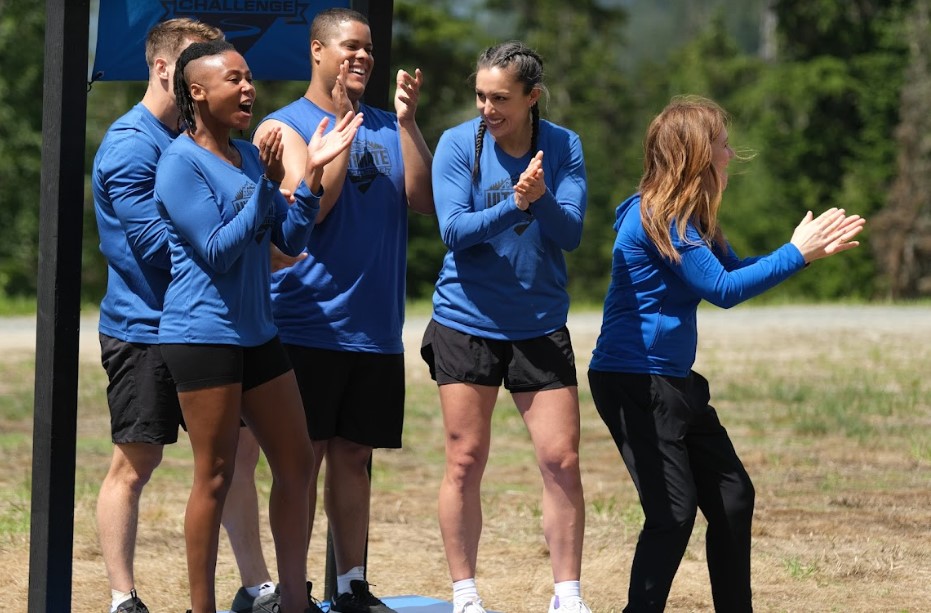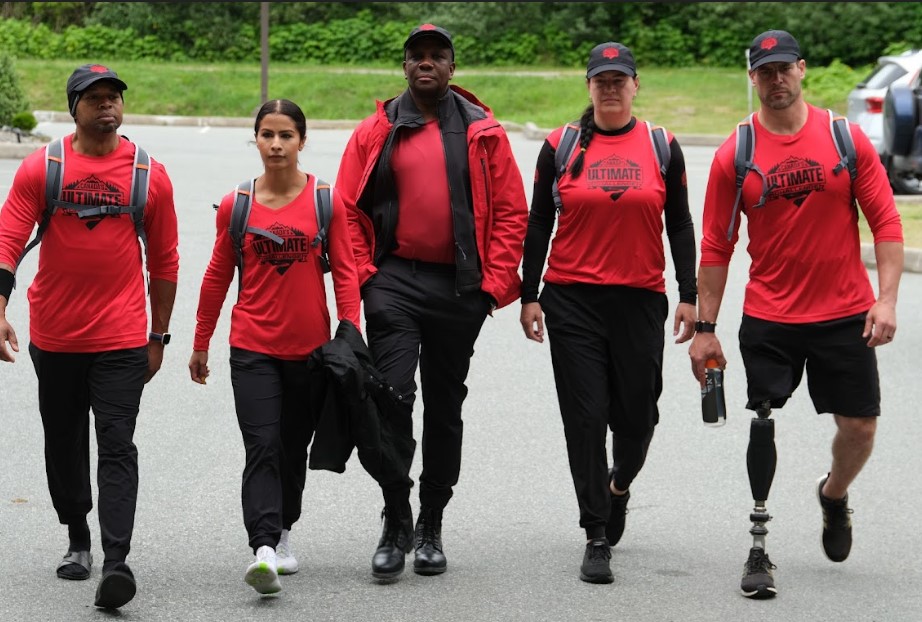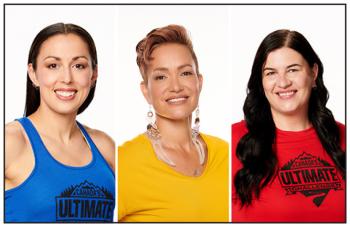Image Caption
Summary
Local Journalism Initiative Reporter
Windspeaker.com
A new reality show airing on CBC starting Feb. 16 has brought 24 diverse Canadians, along with six celebrity coaches, together to compete in a cross-country obstacle course called Canada’s Ultimate Challenge.
The show consists of strength and endurance challenges. It’s a giant obstacle course that unfolds in different locations across Canada.
Indigenous contestants Lori Campbell and Jesse Benjamin, and celebrity coach former Olympian Waneek Horn-Miller, shared their experiences and what they learned about themselves from being part of the show with Windspeaker.com.
“I was really surprised,” said Horn-Miller about being asked to be a coach. “I didn’t quite have the full comprehension of what it was. And then I got there and I’m like, ‘Holy cow. This is huge. This is wild. This is interesting.’”

Horn-Miller is the first Mohawk woman to ever compete for Canada in the Olympic Games. She is an advocate for building Indigenous sport and has worked with the Assembly of First Nations to develop its sport, fitness and health strategy.
On Challenge, she was joined by other Olympians in coaching roles, including Donovan Bailey, Clara Hughes, Gilmore Junio, Jen Kish, as well as Super Bowl champion Luke Willson.
“I’m a water polo player. And a lot of the challenges we found out about right before we did them. So it was a lot of trying to get my athletes—and they’re all really great athletes so they were very multi-talented people that could do a lot of different things—just getting them to work together and be confident enough to do what it took to get it done,” said Horn-Miller. “And that’s a really different type of coaching than say the classic coaching.”
She said, “I would say to them, ‘If you’ve given me everything possible, win or lose, it’s a success. You have to look at each other and trust each other.’ I did use Indigenous understandings of what it means to be a warrior and what it means to work together and trust each other because you can’t win a battle if you are on your own. So I said, ‘We’re not going to win this by one person being a standout. We need everybody.’”
Mi’kmaqi fancy shawl dancer, personal trainer, mom, and advocate Jesse Benjamin didn’t believe it was real when she got a DM on Instagram asking her to apply for the show.
“I thought it was a scam. So I did some research and it seemed legit but I was still really hesitant, and then I thought, ‘well what do I have to lose? I’ll apply and we’ll just see where it goes’.”
Benjamin comes from a family of knowledge keepers. She started fancy shawl dancing three years ago. She also works at a friendship centre in Nova Scotia and hopes to inspire people from all walks of life and show them that they can do anything too.
“I guess I do feel a new responsibility that I need to learn more so that I can share more and make sure that things are passed on. Fancy shawl dancing has been a great way for me to start connecting with other people because knowledge keeper is never one person’s responsibility.”
After having a successful interview, Benjamin was still hesitant to make the commitment, because a family member was sick, she’d recently lost a pet and worried about its sibling, and was anxious about leaving her four children for a month.

“It was really my children that made that decision for me. I presented it to them and said ‘there’s this opportunity that I’ve been given and I don’t know if I should do it because I’d have to be gone for over a month’. And they didn’t even hesitate. They were like ‘You have to do it mom!’” Benjamin recalled.
Once she landed in Toronto and met the other contestants and the coaches, Benjamin switched into competitor mode.
“There were some challenges on the show that I found very physically challenging. There were some where I was the most exhausted I’ve ever been in my life. But none of that was that hard compared to making the decision to actually go. When you’re a mom and your kids rely on you, your animals rely on you, your family relies on you, then it’s letting go of that worry that something’s going to happen when you’re not there and telling yourself it’s going to be okay.”
Lori Campbell also wasn’t sure what to do when she was messaged on social media. She had started chronicling her fitness journey as she approached the age of 50 and had a follower reach out and say she should apply for Challenge.
Campbell is an associate vice president of Indigenous engagement at the University of Regina and is from the Montreal Lake First Nation and is a survivor of the Sixties Scoop. She is two-spirit and uses her ancestors' experiences to reinforce that she can do anything and is a well-known advocate for her community.
“Going into it I didn’t have a strong idea of what it was going to be like, but I certainly had a strong sense of recognizing that it’s hard to see ourselves represented sometimes as Indigenous people and as Indigenous women in sport, and older mature Indigenous women and queer women,” Campbell said.
“So it seemed like ‘well, here’s an opportunity. I have no good reason to say no. I should do this and be what it was that I couldn’t see [when I was younger’.]”

Campbell has a viewing party of close to 70 people who will be joining her at a Regina pub to watch the show. But she’s most excited to be sharing this journey with her mother.
“My mom—and I don’t share anything that she hasn’t given me permission to share—has struggled. She had all seven of her children taken away. Her mom went to residential school. Life has been really, really difficult for her and she’s struggled continuously with addictions and various things.”
Campbell’s mom is living in long-term care and they’ve been spending a lot of time together.
“And her excitement about me being on the show is probably one of the biggest things that I focus on because it feels like such a gift to give her. She said at one point ‘I never thought I’d have a daughter who’d be famous’. And not that I’m famous, but it was clear it’s bringing her such joy and it’s just a gift for me to give her to know that she’s a strong woman who has just had really difficult life circumstances.
“When I first found her, I was 27, and one of the first things she said to me wasn’t about being worried that I’d be upset that she still had addictions but she was worried that I would actually be angry that she made me Indigenous. She said, ‘I was worried you’d be angry that I made you an Indian,’ in the context of the racism and the experiences that she had growing up. And so I’ve worked really, really hard to know who I am and to make that the proudest thing in my life and to show her how proud and lucky I feel that I am Indigenous.”
Donovan Bailey was Campbell’s coach and she said she learned so much from him and that he helped bring out her inner strength and mental stamina.
“He was the oldest coach, and I was the oldest female player. And I learned a lot from him and have a great amount of respect for him and the mindset that it would take to be the fastest man in the world. It takes a certain amount of dedication and perseverance. And we had conversations about life as an Indigenous woman and the struggles in my life, but also as a Black man and the experiences of Black people.”
The cast members made lasting memories and friendships, but Benjamin found her own special way to remember her trip.
“I was so grateful to be able to see all these locations across Canada. Short of meeting and bonding with the people, it was seeing the places I’d never seen before. Because I’d never been out West before. I’d never been up North before. I was a young mother when I started having kids, so I haven't been able to travel much. So that was a part that I absolutely loved,’ Benjamin said. “Seeing the different types of trees and the different animals, the different smell and the different water… I took a flower from each location and pressed it and I have them framed in my room.”
Local Journalism Initiative Reporters are supported by a financial contribution made by the Government of Canada.

